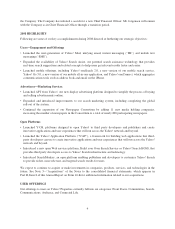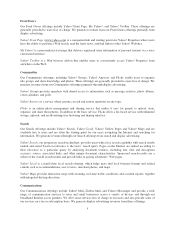Yahoo 2008 Annual Report Download - page 20
Download and view the complete annual report
Please find page 20 of the 2008 Yahoo annual report below. You can navigate through the pages in the report by either clicking on the pages listed below, or by using the keyword search tool below to find specific information within the annual report.We are, and may in the future be, subject to intellectual property infringement or other third-party claims,
which are costly to defend, could result in significant damage awards, and could limit our ability to provide
certain content or use certain technologies in the future.
Internet, technology, media companies, and patent holding companies often possess a significant number of
patents. Further, many of these companies and other parties are actively developing or purchasing search,
indexing, electronic commerce, and other Internet-related technologies, as well as a variety of online business
models and methods. We believe that these parties will continue to take steps to protect these technologies,
including, but not limited to, seeking patent protection. In addition, patent holding companies may continue to
seek to monetize patents they have purchased or otherwise obtained. As a result, disputes regarding the
ownership of technologies and rights associated with online business are likely to continue to arise in the future.
From time to time, parties assert patent infringement claims against us. Currently, we are engaged in a number of
lawsuits regarding patent issues and have been notified of a number of other potential disputes.
In addition to patent claims, third-parties have asserted, and are likely in the future to assert, claims against us
alleging infringement of copyrights, trademark rights, trade secret rights or other proprietary rights, or alleging
unfair competition. In addition, third-parties have made, and may continue to make, trademark infringement and
related claims against us over the display of search results triggered by search terms that include trademark
terms. Currently, we are engaged in lawsuits regarding such trademark issues.
As we expand our business and develop new technologies, products and services, we may become increasingly
subject to intellectual property infringement claims. In the event that there is a determination that we have infringed
third-party proprietary rights such as patents, copyrights, trademark rights, trade secret rights, or other third-party
rights such as publicity and privacy rights, we could incur substantial monetary liability, be required to enter into
costly royalty or licensing agreements or be prevented from using such rights, which could require us to change our
business practices in the future and limit our ability to compete effectively. We may also incur substantial expenses
in defending against third-party infringement claims regardless of the merit of such claims. In addition, many of our
agreements with our customers or Affiliates require us to indemnify them for some types of third-party intellectual
property infringement claims, which could increase our costs in defending such claims and our damages. The
occurrence of any of these results could harm our brand and negatively impact our operating results.
We are subject to U.S. and foreign government regulation of Internet, mobile, and voice over internet
protocol, or VOIP, products and services which could subject us to claims, judgments, and remedies including
monetary liabilities and limitations on our business practices.
We are subject to regulations and laws directly applicable to providers of Internet, mobile, and VOIP services both
domestically and internationally. The application of existing domestic and international laws and regulations to
Yahoo! relating to issues such as user privacy and data protection, defamation, pricing, advertising, taxation,
gambling, sweepstakes, promotions, billing, real estate, consumer protection, accessibility, content regulation,
quality of services, telecommunications, mobile, television and intellectual property ownership and infringement in
many instances is unclear or unsettled. In addition, we will also be subject to any new laws and regulations directly
applicable to our domestic and international activities. Further, the application of existing laws to Yahoo! or our
subsidiaries regulating or requiring licenses for certain businesses of our advertisers including, for example,
distribution of pharmaceuticals, alcohol, adult content, tobacco, or firearms, as well as insurance and securities
brokerage and legal services, can be unclear. Internationally, we may also be subject to laws regulating our activities
in foreign countries and to foreign laws and regulations that are inconsistent from country to country. We may incur
substantial liabilities for expenses necessary to defend such litigation or to comply with these laws and regulations,
as well as potential substantial penalties for any failure to comply. Compliance with these laws and regulations may
also cause us to change or limit our business practices in a manner adverse to our business.
A number of U.S. federal laws, including those referenced below, impact our business. The Digital Millennium
Copyright Act (“DMCA”) is intended, in part, to limit the liability of eligible online service providers for listing
or linking to third-party Websites that include materials that infringe copyrights or other rights of others. Portions
14
























